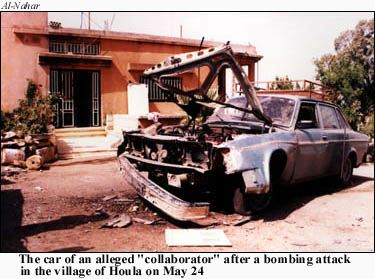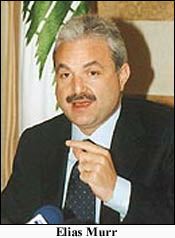 |
| Vol. 3 No. 5 | Table of Contents MEIB Main Page | May 2001 |
 |
Background
In the aftermath of Israel's withdrawal from south Lebanon in May 2000, an estimated 2,300 residents of the security zone were taken into custody by Lebanese security forces and put on trial before Lebanon's Permanent Military Court (PMC) on charges of "collaborating with the Israeli enemy." Some of the detainees, mainly the elderly, were released for medical reasons. The bulk of these suspected "collaborators" received short prison sentences ranging from a few months to a year, and hundreds of have already been released.
However, those who were freed have not been permitted to quietly return to their villages and resume normal lives in the former security zone. From the very beginning, leaders of the militant Shi'ite Islamist Hezbollah movement have attempted to stigmatize those who cooperated with Israeli forces and incite the public against them. Less than two weeks after the Israeli pullout, Hezbollah Secretary General Hassan Nasrallah declared that no collaborators should be allowed to return home. "Let the government send them abroad or put them in a rehabilitation center," he said, "but don't allow them to go back to their homes."1
The Lebanese military, under Syrian pressure has refused to deploy into the areas of south Lebanon evacuated by Israeli forces, leaving those who return to their homes with little protection from Hezbollah. Most say they have encountered incidents of vandalism and physical intimidation by local Hezbollah supporters. In February, Hezbollah militants dug up the graves of 17 SLA soldiers in the village of Aitaroun, claiming they do not deserve to be buried in south Lebanon (according to one source contacted by MEIB, this was done in full view of their weeping mothers). As the stream of returning prisoners has grown in recent months, threats and intimidation have escalated into a series of organized acts of terror.
The "Revolutionary Vengeance Cells"
During the first four months of 2001, there were at least 14 cases of armed attacks on suspected collaborators in south Lebanon, most of them by a shadowy terrorist group calling itself the "Revolutionary Vengeance Cells" (RVC), which typically posts notices at the scenes of attacks threatening continued violence against "all collaborators and traitors" if they do not leave immediately.
The predominantly Shi'ite village of Houla witnessed five attacks in March and April. On March 26, a car belonging to a suspected collaborator was blown up. On April 9, a similar attack took place. On the night of April 20, unidentified bombers launched two simultaneous attacks which destroyed the cars of Ali Yaakub, a Houla resident who previously worked in Israel, and Ali Hammoud, who police said was suspected of having had contacts with Israel during the occupation. On April 29, a car belonging to Ali al-Hajj, who had recently returned home after completing a six-month jail sentence, was destroyed in a blast. Other bombings have occurred in predominantly Shi'ite villages such as Aitaroun, Aita al-Shaab, Kfar Kila, and Aadaiseh.
On April 24, the RVC issued leaflets addressed to "all those who worked in Israel, or took part in the consolidation of its military positions and its civil administration," warning them and their families to leave their homes by the end of the month or face "acts of vengeance." The leaflets, entitled Statement Number One, added that "the hired agents who leave Roumieh [the largest prison in Lebanon, near Beirut], whatever their sentences are . . . should not in any case return to their native villages in south Lebanon. If they do, even after a certain time, the gates of hell will open up in front of them."2 That same day, a car belonging to Imad Hajj Ali Majed, a suspected agent of Israel's Mossad intelligence service, exploded in the village of Khirbet Silm.
Not surprisingly, the attacks continued and escalated after the April 30 deadline passed. On May 6, unknown assailants set on fire a car belonging to Ahmad Jahjah, near his home in the border village of Kfar Kila. Jahjah was allegedly an employee of the Israeli civil administration during the occupation. He fled to Israel following the withdrawal last May, but subsequently returned and served a six-month jail term.
The next day, a bomb exploded in the predominantly Greek Orthodox Christian town of Marjayoun, causing extensive damage to a shop owned by Maroun Abu Rizk and his family. For days, flyers had been circulated in the area warning traitors to pack up and leave. Abu Rizk was reportedly in charge of tax collection for Israel's civil administration during the occupation. At age 72, Abu Rizk was judged too old to stand trial by the military court that has tried suspected SLA collaborators. The Orthodox archbishop of Marjayoun, Elias Kfoury, denounced the attack: "How can this explosion take place only meters away from the police station?" According to local press reports, Abu Rizk's whereabouts are currently unknown, raising fears that he is being held by Hezbollah or the RVC.
On May 16, a suspected collaborator from Kfar Kila who went missing late last month was found dead in an olive grove on the outskirts of the village. Hassan Daher, 65, was originally from Lebbaya, in the western Beqaa Valley, but sought refuge in the Israeli-occupied security zone during the mid-1980's. During the Israeli occupation, he reportedly worked inside Israel, while his two sons joined the SLA. Hezbollah had attempted to abduct him at least once prior to the Israeli withdrawal. While his two sons were convicted of treason and landed in Roumieh prison after the Israeli pullout last May, it appears that Daher had not served any time in prison. The unidentified gunmen who abducted him on April 30 saw to it that he did not escape "justice".
On May 20, the houses of two alleged collaborators in Hasbaya were burned to the ground. On May 23, two more bombings took place in Houla, destroying cars owned by Kamal Kotaish and Mustafa Taher, shattering windows in surrounding homes. A hand-written flyer distributed in the village that day warned collaborators to leave Houla by May 25, the first anniversary of the Israeli withdrawal from south Lebanon.
Reaction to the Violence
 |
While most of the victims of this terrorist campaign have been Muslims, most Muslim political figures have remained silent for fear of appearing to take a pro-Israeli stance. Public outcry has been most evident among Christians, who do not face the same "red lines" imposed by Damascus. This contrast mirrors public discussion of the illegal detention of Lebanese citizens in Syrian prisons (most of these victims are also Muslim). Nevertheless, even among Christian political figures and political groups, reaction has been relatively muted, usually highlighting not the scale or illegality of the retribution, but the fact that it is being implemented by non-state actors. On May 8, the Union of Lebanese Christian Leagues condemned "vigilantes" operating in south Lebanon, adding that "only the government" is authorized to take action on this issue. George Hawi, a former secretary-general of the Lebanese Communist Party, declared that the Army should be sent to southern Lebanon "so that the population does not remain a victim of confessional parties."
After the May 7 bombing, the Progressive Socialist Party (PSP) of Druze Leader Walid Jumblatt called for the Lebanese Army to deploy to the area "to protect the population," but (typical of Jumblatt's deliberate ambiguity on such matters) added the Army should "back the resistance against Israel" (leaving it unclear as to whether the population needs to be protected from the RVC or Israel).
Most international observers see the violence as a natural outgrowth of the security vacuum in south Lebanon. "From day one of the Israeli withdrawal the true fear of UNIFIL [United Nations Interim Force in Lebanon] has never been sectarian warfare, as everyone else was predicting. We kept saying the thing to fear here is Shi'ite against Shi'ite or Muslim against Muslim violence," said UNIFIL spokesman Timur Goksel late last month. However, Goksel declined to explicitly state that a Lebanese Army deployment was needed to restore peace to the border area, calling instead for the "intervention of the communal leaders."4
The violence has led US officials to more assertively press the Lebanese government to deploy the Army in south Lebanon and fueled calls by congressional leaders for a suspension of American aid until this is done.
Conclusion
As pro-Syrian militants methodically intimidate and terrorize the population, the Lebanese army has not been permitted by Damascus to deploy to the area. This clearly indicates that the objective of the violence is not so much to root out those who pose a security risk (for the Lebanese state could do this much more efficiently), but to combat steadily growing opposition to the Syrian occupation among the Lebanese population at large. Just as Syrian occupation forces in the rest of Lebanon have disproportionately targeted Muslim dissidents for violent retribution over the years, the campaign of terror now taking place in the South has hit Muslims the hardest.
Notes
1 The Daily Star (Beirut), 3 June 2000.
2 The Daily Star (Beirut), 25 April 2001.
3 The Daily Star (Beirut), 9 May 2001, 16 May 2001.
4 The Daily Star (Beirut), 9 May 2001, 27 April 2001.
Related Articles
"South Lebanese Face Abductions, Torture and 90-Second Show Trials," Middle East Intelligence Bulletin, July 2000.